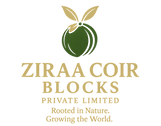Understanding the Various Uses of Coconut Husks
- Zira Coir Industry
- 2 days ago
- 4 min read
Coconut husks are often overlooked in discussions about sustainable practices and resource utilization. However, these fibrous remnants of the coconut, also known as coir, have numerous applications that benefit both the environment and various industries. In this blog post, we will dive deep into the fascinating uses of coconut husks, from gardening to textile production and beyond.
The Versatility of Coconut Husks
Coconut husks are the outer shells of the coconut fruit, which is composed of tough fibers. Freshly harvested coconuts have a green outer husk that eventually turns brown and dry. This transformation allows the tough fibers inside to be used for multiple purposes. Whether it’s for crafting eco-friendly materials or as a biodegradable alternative in gardening, coconut husks are versatile and sustainable.

The coconut husk fibers are strong, durable, and resistant to saltwater, making them particularly suitable for specific applications. Their ability to decompose naturally contributes to ecological balance, showcasing their importance beyond merely being waste.
Uses in Gardening and Horticulture
One of the most popular uses of coconut husks is in gardening and horticulture. The coir from husks can be used as an organic soil amendment or as a growing medium. It improves soil aeration and drainage while retaining moisture, which is critical for healthy plant growth.
Potting Soil: Coconut coir can replace traditional peat moss, which is often harvested unsustainably. Coir provides nutrients and structure to potting mixes, helping plants thrive.
Mulching: Shredded coconut husks can be utilized as mulch to suppress weeds and retain moisture in garden beds. This helps reduce the need for frequent watering, especially in arid regions.
Seed Starting: Since coir provides excellent moisture retention, many gardeners prefer starting seeds in coir-based mixes. The fibers create a suitable environment for germination while also offering good drainage.

Research shows that using coconut coir can lead to improved root development, better plant yields, and healthier crops. It’s an eco-friendly solution that appeals to both hobbyists and commercial gardeners.
What is Coconut Husk Waste Used For?
Coconut husk waste has significant applications across various industries. Below are some noteworthy uses:
Eco-Friendly Products: Coconut coir is used to manufacture eco-friendly products like doormats, brushes, and brooms. These products are biodegradable and contribute to reducing plastic waste.
Textile Industry: In recent years, coir has been processed into fibers for textiles. This innovative use results in durable fabrics for items like bags, floor mats, and upholstery.
Animal Bedding: Shredded coconut husks are a popular choice for animal bedding in livestock farms. The material is absorbent, controls odors naturally, and provides comfort to animals.
Crafts and Decorations: Crafters utilize coconut husks to create unique decorations, art, and craft items. With the growing trend of sustainable living, such handmade items have become increasingly popular.

These diverse uses showcase how coconut husk waste can be transformed into valuable resources, emphasizing sustainability in various sectors.
Environmental Impact and Sustainability
The environmental impact of coconut husks is significant. By utilizing coconuts and their husks, we reduce waste and contribute to a circular economy. As more industries embrace sustainability, the demand for coconut-based products continues to rise.
Using coconut husk fibers promotes:
Waste Reduction: Instead of throwing away husks, industries can process them into valuable products, minimizing landfill waste.
Sustainable Practices: Tropical countries that cultivate coconut palms can economically benefit by processing the entire coconut, promoting local economies.
Carbon Footprint Reduction: Natural coir products are a renewable resource that helps reduce dependency on synthetic materials.
Numerous organizations are now focused on promoting sustainable uses of coconut husk waste. By elevating awareness, more individuals and businesses can contribute to eco-friendly practices.
Coconut husk price per kg varies depending on availability and quality. For more information, you can check suppliers like Ziracoir Industry.
Future of Coconut Husk Utilization
As environmental concerns take center stage globally, the future for coconut husk utilization looks bright. Innovations are continuously emerging in how we can use these fibers. Here are some prospective avenues:
Biocomposite Materials: There’s ongoing research into developing biocomposite materials using coconut husks and other agricultural residues. These materials can replace plastics in various applications.
Biofuels: Scientists are investigating the potential of converting coconut husks into biofuels. This could provide a renewable energy source and further reduce waste.
Eco-Construction: The construction industry is seeing a shift towards sustainability. Coconut husks can be used in building materials for eco-friendly housing, insulation, and more.
Soil Remediation: Studies are looking into using coconut coir in the restoration of polluted soils due to its absorbent nature and ability to improve soil health.

As research expands, we can expect even more innovative uses for coconut husks that can further solve environmental issues, enhance sustainability, and provide economic opportunities.
Final Thoughts on Coconut Husks
Coconut husks are much more than a byproduct of coconut cultivation; they are a treasure trove of sustainable solutions. From improving gardening practices to contributing to eco-friendly industries, the versatile uses of coconut husks highlight the importance of waste utilization. By embracing these applications, we can take significant steps toward a more sustainable future.
As consumers, we can make choices that support sustainable practices, opting for products made from coconut husks and advocating for their use. Whether you are a gardener, a craft enthusiast, or someone interested in sustainability, there’s something to gain from understanding the value of coconut husks.
